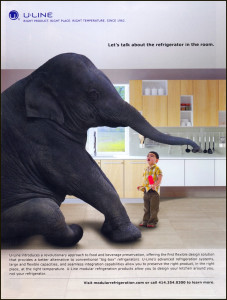The Mad Men behind the latest ad campaign from U-Line, an award-winning market leader in premium built-in undercounter ice making, refrigeration and wine preservation products, were obviously absent the day the professor covered the true purpose of advertising campaigns.
This campaign clearly misses the mark. It doesn’t inform the consumer or tell a story about the product. It is poorly executed and designed not to promote the U-Line brand but to tear down the competition.
The Joke’s on U-Line

U-Line advertisement.
The ad appears in the latest issue of Veranda magazine, a niche publication catering to luxury home design and interior decorating. The print ad features a wide-eyed, shocked little boy in the kitchen holding a popsicle. The bewildered young lad is standing in front of an elephant, which the ad compares to a large cumbersome refrigerator.
Above the photo is the sentence, “Let’s talk about the refrigerator in the room.” This is U-Line’s salvo across the bow of the ship of the conventional “big-box” refrigerator manufacturers such as Sub-Zero, General Electric, Electrolux and Frigidaire.
Rather than focusing the campaign on the uniqueness of U-Line’s modular refrigeration products or the added flexibility of designing a kitchen with a hide-away refrigerator under a cabinet, the ad executives elected to go for a cheap pop. Instead of promoting the U-Line brand, the powers-that-be designed an attack ad featuring a smelly, dirty pachyderm located in the one room of the house harboring more germs than any other room and the one place reserved for culinary antimicrobial concerns.
Oddly enough, the U-Line website prides itself in 50-years of innovation, quality and value in the premium modular ice making, refrigeration and wine preservation market.
Yet the company forgot the purpose of refrigeration, which is to keep food safe to eat for weeks or even months and to avoid the spread of bacteria. The brand used an ill-conceived analogy as a joke.
Like a poorly-prepared standup comedian, the joke is not funny. It is an epic fail. Rather than promoting the U-Line brand, the ad campaign looks more like a politician’s attempt to take down the opposing party.
Playing Politics
Since the early 1800s, negative ad campaigns were popular among politicians. During The Teddy Roosevelt administration, the practice of muckraking was in vogue, and the tactic allowed American journalists, like Upton Sinclair, to expose the political and economic corruption and social hardships caused by big business in a rapidly industrialized nation.
However, in the century since the publishing of Sinclair’s novel The Jungle, the socially-conscious muckraking has turned into silly name-calling and mudslinging. The sophomoric mudslinging is alive and well and is in the spotlight in the current race for the GOP presidential nomination.
Real estate mogul, political outsider and former United States Football League team owner, Donald Trump, leads the race, garnering 33 percent of Republican vote, heading into Wednesday’s debate at the Ronald Reagan Library in Simi Valley, Calif.
Trump is a polarizing figure. He campaigned in front of an estimated crowd of 17,000 Monday in Dallas. He is making waves politically with the voters and also also has captivated the media.
Trump is able to share his political platform, while his opponents, former Florida Governor Jeb Bush, Texas Senator Ted Cruz, Florida Senator Marco Rubio, Kentucky Senator Ron Paul and the rest of the Republican presidential hopefuls are spending more time answering questions about Trump than their stance on gay marriage, healthcare or fiscal reform.
Bush and company have seen their ratings drop in the polls and have resorted to tearing down Trump’s campaign rather than building their own brand.
Chasing the Donald
We know Trump is hard on immigration and has built his slogan on making America great again. Trump’s opponents rarely get to showcase their political ideology. Instead, they are personally attacking and trading jabs with the Donald.
Earlier this summer, former Texas Governor Rick Perry referred to Trump’s run at the presidency as a “cancer on conservatism.” Perry ended his campaign last week.
Fellow political outsider Carly Fiorina, the former CEO of Hewlett-Packard, nearly fell into the negativity trap when Trump made an off-color comment about her face.
The business-woman took the high road in a web ad entitled, “Look at this Face.”
In the ad, Fiorina is speaking at a Republican women’s event.
“Ladies, look at this face and look at all your faces. The face of leadership,” Fiorina says. “This is the face of a 61-year-old woman. I am proud of every year and every wrinkle.”
Since the ad, Fiorina has steadily climbed the polls and is garnering 9 percent of the vote. She is higher in the polls than Paul, former New York Governor, George Pataki, who is embroiled in a twitter war with Trump, and Bobby Jindal.
Jindal, the governor of Louisiana, is using a desperate move to boost his campaign, which is on life support. Jindal has begun attacking Trump on foreign policy. So far it hasn’t worked, as the governor’s week-long assault on the Republican front-runner as not generated any new support. Jindal has received less than 1 percent of the Republican vote.
Clearly the negative ad campaigns will continue until a new president is elected 14 months from now. However, what may work in the political arena doesn’t always work when it comes to refrigeration




